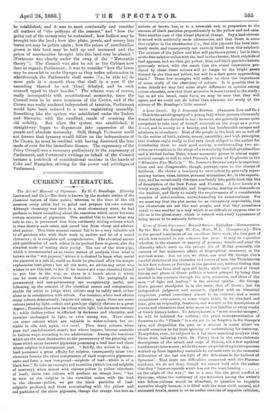Lives of Greek Statesmen. Second Series : Ephialtes—Hermocrates. By the
Rev. Sir George W. Cox, Bart., M.A. (Longmans.)—This is the second instalment of an excellent little work, the first part of which was noticed in our columns last year. It may be a question whether, in the absence or paucity of personal details and amid the obscurity which rests on the private life of Hellas generally, the careers of her statesmen admit of biographical treatment in the strictest sense. But no one, we think, can read Sir George Cox's careful sketches of the character and career of men like Themistocles in his first volume, or Pericles in the present one, without feeling that new light has been shed upon old facts; while each period of Greek history and phase of Greek politics is better grasped by being thus studied in the concrete through the acts, measures, and ideas of the men "of light and leading" in the several epochs. Sir George Cox's general standpoint is, in the main, that of Grote ; but his independent judgment and research, together with an historical scepticism pushed sometimes almost to an extreme, and a moral earnestness over-severe, as some might think, in its standard and tone, give an originality, freshness, and warmth to his descriptions of events and characters that were more or less familiar to every reader of Greek history before. To Aristophanes, a "mere scandal-monger,' he will be indebted for nothing ; the gross misrepresentation of Socrates in the " Clouds " is a sin not to be forgiven in Sir George's eyes, and disqualifies the poet as a witness in cases where we should ourselves be far from ignoring or undervaluing his testmony. Thucydides, even, he subjects to a far more searching analysis than Grote does, believing (with Dr. Paley) that in the over-elaborate descriptions of the attack and siege of Plataia, not a few mythical incidents are interwoven ; while the same suspicion of a picturesqueness worked up from legendary materials he extends even to the immortal delineation of the last sea-fight of the Athenians in the harbour of Syracuse ! That there are difficulties connected with the Platman incidents, we do not deny, though we cannot bold with the author that they " form an episode which has not the least bearing on the origin of the war ;" but in a case like the great conflict at Syracuse, where the testimony of eye-witnesses among the writer's own fellow-citizens would be abundant, to question an exquisite narrative simply because it is filled with the most vivid, natural, and animated details, seems to ns an undue exercise of negative criticism,
particularly when applied to an historian as scrupulous about facts as he was sparing in ornament. Apart from this, however, we cannot praise too highly the skill with which Sir George Cox has performed
the difficult task of depicting the lives of contemporary statesmen and Generale with the smallest possible repetition of the events in which they were at the same time the principal agents. It is not every one who could write the lives of Cleon, Demosthenes, and Nicias, without making of the Sphacterian affair a thrice-told tale. Nothing, too, can be better drawn than the contrast between the soldier-statesmen of the days which ended with Pericles, and the popular leaders, beginning with Cleon, whose activity lay rather in the tongue than the sword. We wish we had room to quote some excellent remarks on the Athenian drama as an "instrument in the education of the people for the whole business of life" (p. 55) ; nor have we ever seen the sum of Greek history more happily expressed than in this single sentence :—" So far as the theory of city autonomy, universally accepted by the Greeks, rendered it possible for her to do so, Athens, by her maritime power, welded her subjects into a nation ; Sparta undid her work, and the result was that both fell prostrate, first before the Macedonian, and then before the centralising power of Rome." (p. 252.) In one point it seems to us that our author's righteous indignation at the murder of Demosthenes has led him into an injustice toward the Syracusans, when he twice asserts that that act was perpetrated" in flagrant viola- tion of a distinct compact." The words of Thucydides (vii., 82) do not appear in our judgment to warrant this, the terms of capitulation applying only to the troops under Demosthenes, and not to their gallant leader, who, according to one story, attempted to kill himself rather than surrender, and whose name was engraved on the memorial pillar, while that of Nicias, who was considered to have disgraced himself by capitulating, was, according to Pausanias, omitted. We would cordially recommend this admirable volume to our readers, young and old. The experiences of Greek statesmen may have more than one lesson to read to the political leaders of our day.



































 Previous page
Previous page